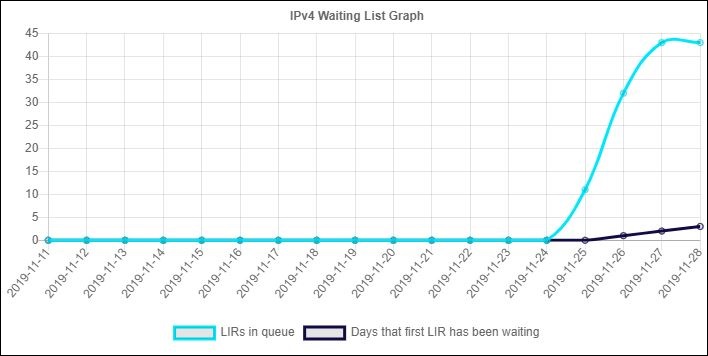RIPE, the organisation that allocates IPv4 addresses for Europe, has finally exhausted its supply.
“On 25 November 2019, we made our final /22 IPv4 allocation from the last remaining addresses in our available pool,” RIPE said in a statement.
“We have now run out of IPv4 addresses.”
RIPE is a not-for-profit that acts as the regional internet registry for Europe, the Middle East, and parts of Central Asia.
One of RIPE’s services is providing IP addresses to local internet registries (LIR)s which tend to be ISPs.
Without new IP addresses, the region could be limited in the number of new internet connections that can be made.
“Our announcement will not come as a surprise for network operators,” RIPE said.
“IPv4 run-out has long been anticipated and planned for by the RIPE community.
“In fact, it is due to the community's responsible stewardship of these resources that we have been able to provide many thousands of new networks in our service region with /22 allocations after we reached our last /8 in 2012.”
RIPE said it will continue to recover IPv4 addresses from outgoing businesses or networks that don’t need them.
“While we therefore expect to be allocating IPv4 for some time, these small amounts will not come close to the many millions of addresses that networks in our region need today,” RIPE said.
In the meantime, any ISPs trying to acquire IPv4 addresses will simply have to wait.
Bring on IPv6
People have been expecting the exhaustion of IPv4 addresses for years.
Back in 1998, the Internet Engineering Task Force developed IPv6 as a draft standard (which became a standard in 2017) but widespread adoption of the protocol has been slow.
IPv6 addresses are more complex than IPv4 (128-bit compared with 32-bit) which means the number of available IPv6 addresses is significantly larger – approximately 340 billion billion billion billion compared to the 4.3 billion total IPv4 addresses.
Here's an example of an IPv6 address – 2001:0db8:85a3:0000:0000:8a2e:0370:7334.
Although the two protocols are not interoperable, transition mechanisms like dual-stack IP implementation and public-facing IPv6 addresses are designed to help networks move to the updated protocol.
RIPE issued a warning against letting the lack of IPv4 addresses stunt the spread of information.
“Without wide-scale IPv6 deployment, we risk heading into a future where the growth of our internet is unnecessarily limited – not by a lack of skilled network engineers, technical equipment or investment – but by a shortage of unique network identifiers,” RIPE said.
“We are optimistic and excited to see what the next chapter will bring.
"So let's get to work – and together, let's shape the future of the internet.”











